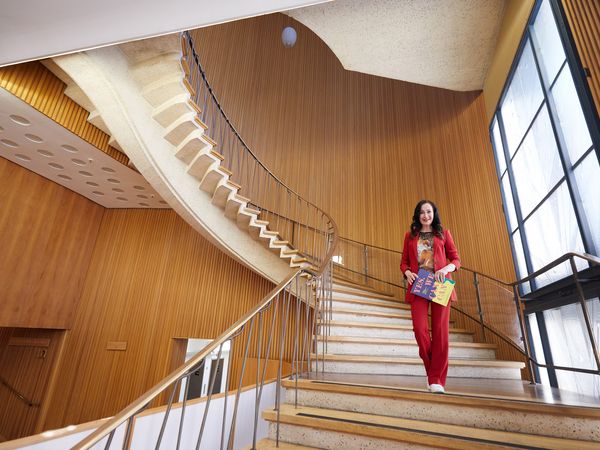In the summer of 1819, Jakob Offenbach, or Jacques, as he later called himself in Paris, was born in the old town of Cologne. 200 years later, Cologne is celebrating its ‘prodigal son’? Is Jakob a Kölner?
In fact, young Jakob, who grew up in the cathedral city, got his musical education in the city's taverns. He and his siblings played there for entertainment. Some people in Cologne have never forgiven him for making his career in Paris. So his relationship with Cologne was perhaps a bit ambivalent, but he definitely had the Cologne gene. This is particularly evident in Offenbach's humour. In a variation on Rossini's quote ‘Mozart of the Champs-Élysées’, one should call him the ‘Mozart of the cathedral square’.
Our photographer took your picture in the foyer of the WDR building, not far from the cathedral square. What role does the WDR play in the Offenbach year?
A big one. The Westdeutscher Rundfunk will take on the role of ‘European Media Host’ with its cultural programme WDR 3 in the Offenbach year and will spread the word about the anniversary in the media with its own projects and productions, as well as by broadcasting concerts and operas and holding panel discussions. Outstanding WDR projects include: the birthday concert at the WDR Funkhaus and the Offenbach Operetta Revue with the WDR Funkhausorchester.
You were awarded the KulturReiseLand NRW innovation prize for the programme of the Offenbach Year 2019, ‘Yes, we CanCan’. What is so innovative about the programme?
The Cologne Offenbach Society was honoured for a concept that strengthens the promotion of art and culture outside of major cities. Under the title ‘Jacques Offenbach's musical picnic in castles and parks in the Offenbach Year 2019’, Offenbach's music is also being made accessible to new target groups. In addition, the jury also praised the city-region networking approach between castles, parks, tourism associations and municipalities. The award is outstanding proof that we have chosen the right approach with our campaign, because it is open and participatory. The concert audience is a guest in the castles or parks of the region. This special setting enables extraordinary concert experiences away from the big concert halls.
The Cologne University of Music and Dance is the largest music university in Europe. How are the colleagues celebrating the Mozart of the cathedral square?
The music academy is involved in a variety of ways. Students from the singing classes will perform pieces on stage. Chamber music ensembles from the academy will visit social institutions and play Offenbach works there. A promenade concert is being created in a joint project between the Cologne Music Academy and an ensemble from Paris, which will play throughout the entire Chocolate Museum in one evening. An academic symposium – a collaboration between Frankfurt, Cologne and Paris – will set thematic accents. In a word: the university is contributing what it stands for: musicological research and great music!
It is said that Jacques Offenbach is like Cologne: open, lively and always in opposition to the authorities. What do you personally like about Cologne?
Cologne, or Kölle, as it is affectionately known, is of course the most beautiful city in the world. The Cologne dialect expresses the city's cheerful, pragmatic and critical nature. I am a native of Cologne and am familiar with the ambivalence that permeates us: Alongside our pronounced sense of cosiness, our contemplative and pleasure-seeking way of life, there is the great aspiration to present Cologne as a metropolis, a media city, a city of art and music. It is precisely this combination of simultaneous striving for greatness and frugality that, for me, characterises the city's special charm.
